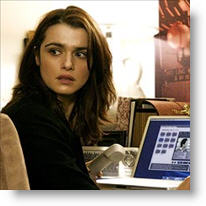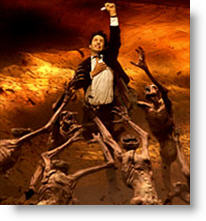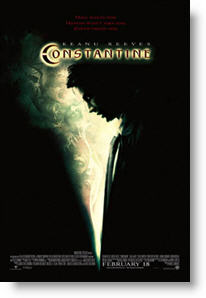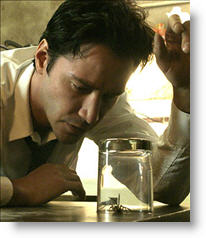Personal interview with actors Keanu Reeves, Rachel Weisz, Gavin Rossdale and screenwriters Kevin Brodbin and Frank Cappello of “Constantine” (2005)
by Chris Monroe
Staff Writer
Meeting with the makers of “Constantine” in Los Angeles yielded some intriguing responses about spirituality, as well as some interesting dialog concerning their ideas about telling this story. Dancing on such weighty subject matter, it was impossible to ignore discussing pertinent issues such as Heaven and Hell, while typical discussions about filmmaking took a back seat.
Keanu Reeves — Having played such spiritual/Messianic/hero roles in the past, it was nearly unavoidable to ask Keanu about his career, and how these concepts resonate with him personally. Speaking of the character of John Constantine, he said:
The aspect for me is a kind of secular religiosity. The piece itself is using icons and a platform—in a kind of Catholic heaven and Hell, God and the devil, human souls (fighting for them)—but I was hoping that these concepts could become a platform that are humanistic. The journey of this particular character is hopefully relatable, even though they’re such fantastical characters and situations. It’s still a man trying to figure it out.
And in speaking of the other roles he has played, he said,
“Not only are they interesting, I think that those kinds of journeys—the hero journey, these are all kind of seeking aspects of, hopefully, that have something of value in terms of our lives.”
It seems he avoided disclosing his personal beliefs, but the interest unavoidably kept surfacing.
When asked about a journal he may have kept while working on this film concerning the different sides of spirituality, he seemed to playfully deny it. Since it was hearsay, Keanu replied by saying, “They have no idea what they’re talking about.” But he did go on to discuss some of his work on the character. He said:
In the process, for me, it’s writing things down thoughts, just working on the role. The film speaks for itself in a way, and that’s really what I was working on. If I had anything that was like that, it was a script called “Constantine” and the journey that that character takes learning about this curse that was given to him as a kid—a “gift” as another character says, but Constantine doesn’t see it quite like that. I think part of the journey is Constantine understanding his life, and the circumstances, and he comes to a kind of ambivalent peace of sorts. So, really, it was the script.
Other work that Keanu did on this film behind the scenes involved a bit of the writing. He confirmed what had been said, but made a clear distinction about his idea of “spirituality.” He said:
Francis Lawrence—he’s a wonderful collaborator. The spirituality is a word I really don’t feel is something to apply to Constantine, and if it is, it is very humanistic—as it always is, obviously. It’s more flesh and blood somehow than spiritual. I feel some kind of flesh and blood aspect of it. One of the expressions at the end of the film is.” I guess there’s a plan for all of us. I had to die twice just to figure that out. Like the book says, He works His works in mysterious ways. Some people like it, some people don’t,” is mine.
To clarify, he was asked, “That’s your line?” Keanu responded:
That’s mine. And that to me was the ground for where Constantine ends up. And there’s still that ambivalence. But there’s an acknowledgement, and in that acknowledgement, I feel like you’re watching a character who’s dealing with something that happened to him that he didn’t understand. He was given this curse, or this gift, to be able to see the world beyond the world, and in despair as a young man, overwhelmed, he takes his own life and he goes to Hell. He comes back from Hell, and he has no idea why.
And I think that search of his, trying to kind of orient, like, [with Yiddish accent] “Hey, Fella. I’m doing all this work. Whada ya doin’ to me?” So that was my impact. I don’t know if that’s sp-. It’s not sp-. I can’t-. But it’s flesh and blood, I thought.
By the end Keanue refrained from using the word “spiritual,” at all.
But one “spiritual” concept that was asked of him was the idea of repentance. Here is what he said about this concept in regards to the character Constantine:
Repentance—I think the aspect of repentance is born and expressed in his final act. That’s his repentance and his sacrifice. I think that’s what gives him the shot at going “upstairs.” But there’s also the Constantinian twist of, “Did he make the sacrifice so that he could go to Heaven?” Or “Does he really mean it?” But he does. He does. I mean ultimately he does, otherwise the Man upstairs knows. He’s just like Santa Claus. If you’re telling a lie or not, naughty or nice, He knows.
Eventually, Keanu was asked point blank about religion, but stated he didn’t want questions asked about it. He explained:
It’s something I think is very personal, and it’s something that is private. But I also like the flesh and blood character, like I said earlier. It’s something that’s obviously to my taste. But in terms of any specific denominational. I’d rather not touch upon, personally. Thank you.
Although a bit curt in his response, Keanu did address a remark one of writer made about him, saying that he, Keanu, is the kind of guy that wants to affect the world in a positive way. He laughed and said,
“In my art. I’m making up for what I do in life. It’s my penance. No.”
But getting serious, he shared his take on his work:
For me, personally, I like that aspect in the work that I do, because it’s what I enjoy in art. I don’t want to go to a movie and not have something that I can come away with, that I can either think about, that adds to something. If it doesn’t have that element, it doesn’t attract my interest.

 Rachel Weisz’s faith in real life is Secularism. However, her mother was a convert to Judaism.
Rachel Weisz’s faith in real life is Secularism. However, her mother was a convert to Judaism.
Rachel Weisz
Rachel Weisz shared some of her background, as well as a concise summary of what one can expect from this movie. Although she is not a fan of scary movies, here is what she said:
It’s kind of a Judeo-Christian mythology, from the Old Testament to the New Testament, and I’m very familiar with those two books. That’s what I was raised reading. Did it bother me? No. I thought it was very interesting to have something that’s obviously a Hollywood movie, obviously entertaining and scary and all those things—but it’s set within a universe where really important questions are asked. They’re very serious themes and questions housed within what is undoubtedly an entertaining Hollywood movie. And I don’t see why one can’t have both.
Kevin Brodbin and Frank Cappello (screenplay writers)

Probably the most interesting interviews were with the writers, Kevin Brodbin and Frank Cappello. They offered insight into how this screenplay came to be, including some of the backstory from the comic book “Hellblazer” that it’s based on. When I asked them about the development of the script, Cappello disclosed the evolution of some of the themes.
I think the idea of [true] redemption came about through, one, casting Keanu—because Keanu is a very spiritual person in his own right. He basically believes that we all have a purpose here. John [Constantine] in the comic book knows both sides [good and evil]. He doesn’t totally agree with both sides. He fights for humanity here. And so he uses both sides. He’s a con man. He uses both sides to get what he needs, which is a selfish thing, but in a way not, because he’s still helping humanity. So the themes that came about—John pretty much wanting to do the right thing—has always been there. He’s always been a guy that does the right thing. But to actually do the right thing to get to Heaven? It was not in the comic.
Brodbin also chimed in about Constantine here:
It’s also because he [Constantine] is coming at it from a cynical point of view. He’s doing things—sending demons to hell or whatever—but he’s doing it to kind of buy favors from God. He’s a guy who’s discovered he’s dying, and he knows where he’s going. He’s going to hell. And so he comes from this thing like, “Anywhere but hell.” He’s essentially trying to negotiate with God.
Expressing that the character John Constantine is ultimately endeavoring to do the right thing, Brodbin and Cappello also talked about some of the weaknesses of this character. One aspect in particular was why Constantine didn’t think to ask God for forgiveness. Here is what Cappello said:
He wouldn’t. His pride gets in the way of him asking to be let off the hook. So he basically [says], “I’m going to do it myself. I believe in myself.” And when you believe in yourself, you’re not going to ask for help. You don’t want to lower yourself to beg. And that’s kind of what he almost does to Gabriel. He almost gets there in that scene. But you’ve also got to remember he is a character. He is a character that has a defined set of rules for himself. He pretty much says, “I won’t beg. I won’t ask for forgiveness. I won’t do all these things.”
So when you’re working with that character that walks that line between knowing there’s a Hell, knowing there’s a Heaven—he knows it. There’s no faith going on here.
In other word’s, he’s not going by blind faith. He’s been there. He’s seen it, and he doesn’t agree with him. So, as Gabriel says, “You don’t really have faith—you just know.” He really does already know what we wish—what faith is—what we all wish we knew in our heart.
Some people accept it totally. Some people go, “You gotta prove it to me. I have to see it.” John’s seen it. But what makes this hardened character interesting is that he does make a kind of change by the end.
Cappello explained:
There’s only one scene in the whole film, honestly, it’s when he’s sitting there dying, and he’s been thrown up against this glass. He looks up, and he just goes, “You know, I know I’m not welcome, but can You help me here?”
Eventually, it seems that the intention was to show Constantine change by breaking down and asking God for help.
Brodbin explained that the background from which they wrote this screenplay involved drawing from ideas of faith, but also from the religious mythology of the comic book:
For me it was about looking for the logic in it, so that we understand that he’s a guy that walks between heaven and hell, and he’s someone who understands them both to some degree—but has such a hole in his own life, in a way, that he doesn’t fully. He’s not a fully formed person until he goes through this redemption. I think he’s somebody who’s got a “God-shaped hole” or a “person-shaped hole” or whatever.
He’s a guy who’s in a lot of pain, and he uses sarcasm and cynicism or whatever to hide that. But going through the redemption, I think the one part where he does show faith is when he asks for the other girl to be saved rather than himself. That’s when everything changes. That’s when he starts to see that there are things even beyond what he sees of Heaven and Hell.
Gavin Rossdale
Singer/songwriter from the former rock band Bush, Gavin Rossdale, also broke into the acting market recently, with this role being his largest yet. When asked about spirituality, Rossdale seemed very open to share some of his personal beliefs about faith, as well as ideas about this film.
What was the most interesting for the whole film was that here was this man struggling with the conflict of good and evil within himself.
I consider myself very religious, but on a much more personal level than the structured religion of necessarily following a particular denomination. I feel very close to a higher power, which I’m used to calling “God,” but I wouldn’t force that idea on someone else. I just would hope that they would have some idea. That’s just a conscience. It’s a way of being.
I think that struggle goes through people every day—of the idea of temptation; that idea of selfish versus selfless. What was so pointed about the film was that it’s referred to as “buy” his way back into heaven, to earn his way back into heaven, because, obviously, he’s committed suicide, so (in the Catholic religion) he’s not allowed back into heaven.
What was so amazing and so moving is that this is now what he’s dedicating his life to. He’s running out of time because he’s dying of lung cancer, and just one of the most moving things to me is that he is prepared to give that up. He’s prepared to give up that ticket back in, and give it to Angela, for her sister. And what is so smart about the film and so amazing, is that there is no physical love between the two. It’s such a relief to see that there wasn’t a long kissing scene between them. It was this very powerful connection, that he suddenly felt responsible to help her.
When really, is that not the struggle of life? Is that not the struggle of people? This [movie] is a great question of theology, and it’s very intriguing. Is there a door to heaven? And is there a door to hell? Or is it just the psyche? Is it just the dilemma of being human?
HELL: Fact or Fiction—Is it an actual place? Answer
Why was Hell made? Answer
What is eternal death Answer
Is there anyone in Hell today? Answer
Will there literally be a burning fire in Hell? Answer
What should you be willing to do to stay out of Hell? Answer
How can a God of love send anybody to Hell? Answer
What if I don’t believe in Hell? Answer
ETERNAL LIFE—What does the Bible say about it? Answer
THE GOOD NEWS—How to be saved from Hell. Answer
Are you good enough to get to Heaven? Answer
How good is good enough? Answer
Will all mankind eventually be saved? Answer




Going on from there, Rossdale also stated that he thinks his character, Balthazar, hits on other social issues besides religion. He said it was a “direct hit” in the fact that his character is a business man.
What I found a very interesting aspect is that, not only did it [the film] raise up very interesting questions that intrigued.you guys, but it’s also very political. People say, “Does evil really exist?” Well, unfortunately, of course it does, because people perpetrate acts that portray such evil and such disregard for human life, that it only can be an explanation that there are elements of evil at work on this Earth.
I firmly believe that you can’t just explain things away on society. It’s the only explanation for atrocious acts that happen to innocent people on a daily basis. I think it’s very sad.
And I think it’s a wonderful thing that this film throws up this idea of the ability and the power of change. Kids seeing this, adults seeing this, it’s so poignant and so resonant, this film, “Constantine,” because it shows this man’s journey and what he learns about himself—and almost the satisfaction that comes with giving yourself away, giving away his ticket.
It gave me shivers when I watched it in the cinema. It really fills me now with this sense, which is why I’m so proud to be a small part of this film, because it really has a positive message.
Rossdale discussed some of his music and more of his take on the film:
For me, I always like to write about the human condition, the struggle that we go through. I’ve never left a song where there hasn’t been some sort of resolution, some kind of hopefulness at the end of it. I really hope that each song that I’ve written has that sense of hope in there, or else that despair is something I wouldn’t want to be responsible for, because I think that life, ultimately, has powers of goodness; and ultimately, I believe in good over evil; and ultimately, I think this is what this film is about.
See our film review of “Constantine”.


